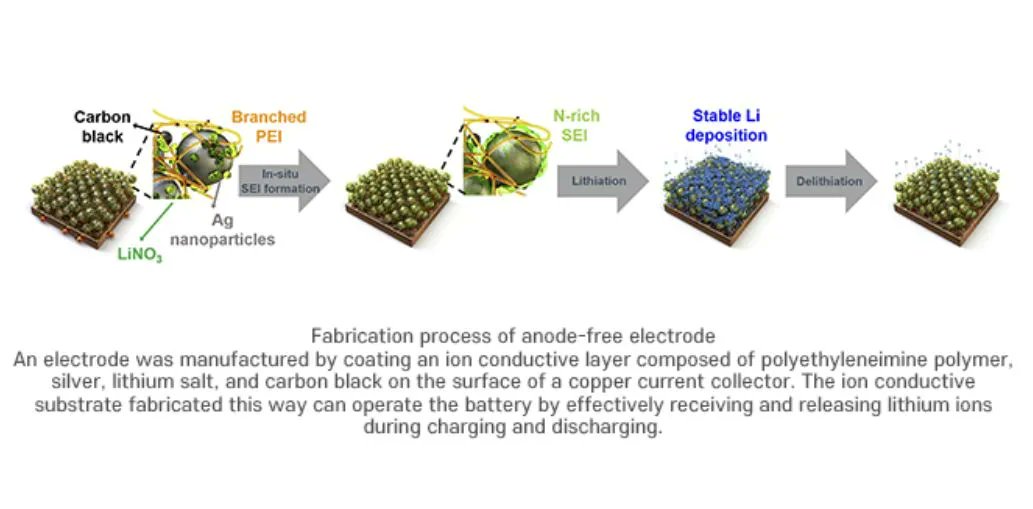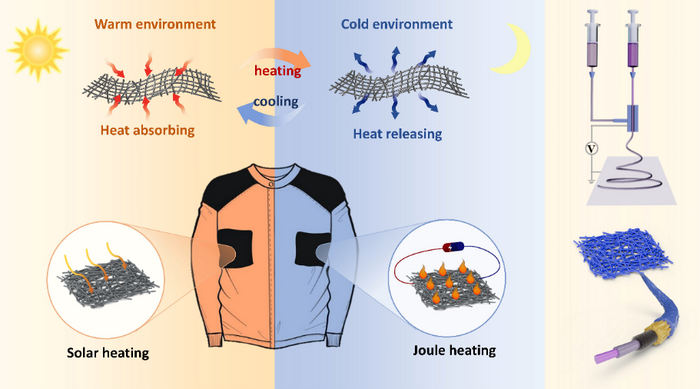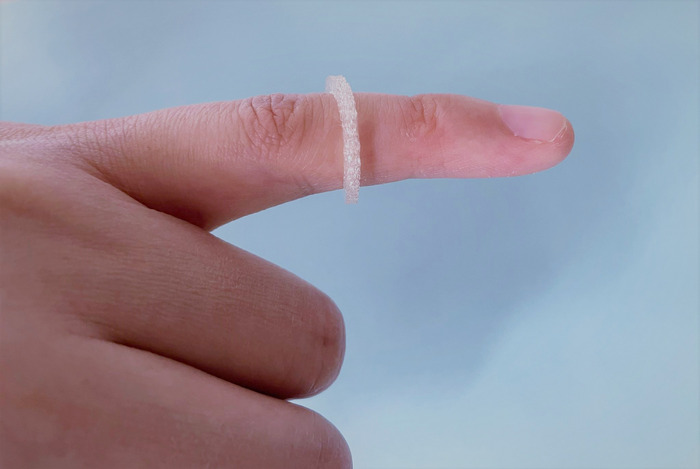
POSTECH-UNIST joint research team succeeds in developing anode-free Li batteries with maximized energy density, improving energy density by 40%.
The number of newly registered electric vehicles (EVs) in Korea surpassed 100,000 units last year alone. Norway is the only other country to match such numbers. The core materials that determine the battery life and charging speed of now commonly seen EVs are anode materials. Korea’s domestic battery industry has been committed to finding revolutionary ways to increase the battery capacity by introducing new technologies or other anode materials. But what if we get rid of anode materials altogether?
A POSTECH research team led by Professor Soojin Park and PhD candidate Sungjin Cho (Department of Chemistry) in collaboration with Professor Dong-Hwa Seo and Dr. Dong Yeon Kim (School of Energy and Chemical Engineering) at Ulsan Institute of Science and Technology (UNIST) have developed anode-free lithium batteries with performance of long battery life on a single charge.
The newly developed anode-free battery has a volumetric energy density of 977Wh/L which is 40% higher than the conventional batteries (700wh/L). This means that the battery can run for 630km on a single charge.
Batteries usually change the structure of anode materials as lithium ions flow to and from the electrode during repetitive charging and discharging. This is why the battery capacity decreases over time. It was thought that if it was possible to charge and discharge only with a bare anode current collector without anode materials, the energy density – which determines the battery capacity – would increase. However, this method had a critical weakness which causes significant swelling of the anode volume and reduces the battery lifecycle. It swelled because there was no stable storage for lithium in the anode.
To overcome this issue, the research team succeeded in developing an anode-free battery in a commonly-used carbonate-based liquid electrolyte by adding an ion conductive substrate. The substrate not only forms an anode protective layer but also helps minimize the bulk expansion of the anode.
The study shows that the battery maintained high capacity of 4.2mAh cm-2 and high current density of 2.1 mA cm-2 for a long period in the carbonate-based liquid electrolyte. It was also proven both in theory and through experiments that substrates can store lithium.
Original Article: The Battery that Runs 630 km on a Single Charge
More from: Pohang University of Science and Technology | Ulsan Institute of Science and Technology
The Latest Updates from Bing News
Go deeper with Bing News on:
Anode-free lithium battery
- Novel Anode Material Boosts Lithium-Ion Battery Performance
Reviewed by Lexie Corner Dr. Han Joong Tark and student researcher Lee Do Geun at Korea Electrotechnology Research Institute's Nano Hybrid Technology Research Center have devised a novel manufacturing ...
- Single-walled carbon nanotubes doped with 'nitrogen' enhance the performance of secondary battery anode
Researchers have developed a new manufacturing technique for "silicon/nitrogen-doped carbon composite anode materials." These materials aim to enhance the capacity and stability of lithium-ion battery ...
- A Cheaper and More Sustainable Lithium Battery: How LiDFOB Could Change Everything
Scientists have developed an ultralow-concentration electrolyte for lithium-ion batteries. Lithium salts enhance the power of batteries but also increase their cost. A new electrolyte with a very low ...
- Beyond Lithium: What Will the Next Generation of Batteries Be Made Of?
The clean energy revolution requires a lot of batteries. While lithium-ion dominates today, researchers are on a quest for better materials.
- Lithium-Ion Battery Anode Market worth $46.5 billion by 2028 - Exclusive Report by MarketsandMarkets™
CHICAGO, April 11, 2024 /PRNewswire/ -- The report "Lithium-Ion Battery Anode Market by Materials (Active Anode Materials and Anode Binders), Battery Product (Cell and Battery Pack), End-Use ...
Go deeper with Bing News on:
Anode-free battery
- EXCLUSIVE: KULR and Amprius Join Forces, New Partnership Set to Revolutionize Military and Aerospace Batteries
KULR Technology Group and Amprius Technologies have announced a strategic partnership to integrate Amprius' high-performance cells into KULR ONE Space and Guardian batteries. This will enhance safety ...
- Tesla EVs could get a massive range boost from new battery tech that promises a 373-mile range from a 10-minute charge
What’s more, it says that just 10 minutes of super-fast charging will add a staggering 600km (or around 373-miles) of range on the Chinese testing cycle. The battery technology has apparently been ...
- Novel Anode Material Boosts Lithium-Ion Battery Performance
Reviewed by Lexie Corner Dr. Han Joong Tark and student researcher Lee Do Geun at Korea Electrotechnology Research Institute's Nano Hybrid Technology Research Center have devised a novel manufacturing ...
- Single-walled carbon nanotubes doped with 'nitrogen' enhance the performance of secondary battery anode
Researchers have developed a new manufacturing technique for "silicon/nitrogen-doped carbon composite anode materials." These materials aim to enhance the capacity and stability of lithium-ion battery ...
- New Sodium Battery Capable of Rapid Charging in Just a Few Seconds
However, the development of a hybrid battery with high energy and high power density requires an improvement to the slow energy storage rate of battery-type anodes as well as the ... Subscribe for ...










